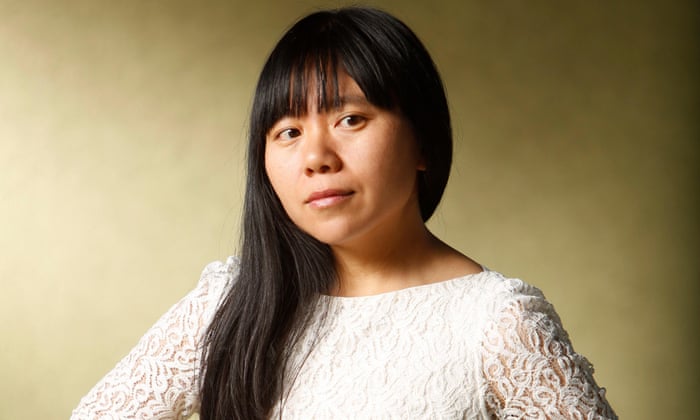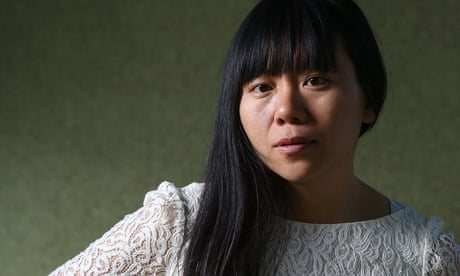Interview by Alice O'Keeffe

Writer Xiaolu Guo: ‘I think of my parents as slaves of industrialisation.’
Xiaolu Guo is a Chinese writer and film-maker based in London.
She was named one of Granta’s best young British novelists in 2013, and has been shortlisted for the Orange prize.
Her memoir, Once Upon a Time in the East, is published this month.
Your memoir begins with you, as a newborn baby, being given away by your parents to a destitute peasant couple. Do you understand now why they did that?
You could go into lots of psychological explanations.
But there were also simple practical reasons.
My father had been sent away to a labour camp, and my mother was working full-time in a factory and performing in revolutionary operas in the evening.
There was no one there to raise me.
The peasant couple took me to live in a mountain village, and that’s where I stayed for the first two years of my life.
But they couldn’t feed me, so aged two they gave me back to my grandparents, who lived in a small fishing village, Shitang.
I lived there until I was seven.
The book describes a childhood in which you often went hungry. But even more striking, to me, was the emotional poverty of your early years. Was that typical of China in that period, do you think?
Shitang at that time, like much of rural China, was really still an ancient tribal, barbarian society.
It was full of old ladies wearing black, with bound feet.
There were a lot of widows, because the men were all fishermen, and they died at sea.
Life was a hard struggle, and nothing else.
Feelings didn’t come into it.
My grandmother had been sold off as a child bride at the age of 12, and she was not considered to be a person in her own right, by my grandfather or anyone else.
I know she did love me, but that word was never used.
You met your parents for the first time aged seven, and went to live with them in a communist-era compound. How did that compare with Shitang?
It was a revelation, but it was brutal in a different way.
You met your parents for the first time aged seven, and went to live with them in a communist-era compound. How did that compare with Shitang?
It was a revelation, but it was brutal in a different way.
I think of my parents as slaves of industrialisation – the state had its ambitions, and it completely shaped family life.
There was no private or personal space.
My mother worked from six in the morning until midnight.
I had a connection with my father, but neither of my parents had much emotion to give to their family.
For all of you, art provided an escape. When did you realise you wanted to be an artist?
In the book I describe meeting some art students on the beach in Shitang as a very young child, and immediately feeling a connection with them.
For all of you, art provided an escape. When did you realise you wanted to be an artist?
In the book I describe meeting some art students on the beach in Shitang as a very young child, and immediately feeling a connection with them.
I think there was a deep genetic memory there – my father was an artist, and my brother also became a painter, though of course I didn’t know either of them at that point.
But it was when I started reading western books as a teenager that I felt rage about my own childhood.
It was this rage and bitterness that sent me into the world of literature.

You moved to Beijing in your late teens to attend film school, and came into contact with the radical art scene of the 1990s. How did that influence you?
As a 20-year-old country girl seeing those artists was very powerful.

You moved to Beijing in your late teens to attend film school, and came into contact with the radical art scene of the 1990s. How did that influence you?
As a 20-year-old country girl seeing those artists was very powerful.
It was a type of performance, body art, often involving nudity, that was a very painful expression of what my generation had lived through.
It was political through and through, I don’t think I’ve seen anything as potent as that in the west.
I stayed in Beijing for 10 years, until the beginning of the 2000s, when it became unbearable.
The combination of political and commercial forces was overwhelming. [She moved to London in 2002, on a scholarship to the National Film School.]
You now have a four-year-old daughter. Were you thinking of her when you wrote about your own childhood?
This book is in one sense a love letter to her.
You now have a four-year-old daughter. Were you thinking of her when you wrote about your own childhood?
This book is in one sense a love letter to her.
But it is also a farewell to my youth.
I’m 40 years old, and the desperate, passionate, angry energy that I had as a young writer is ebbing away.
I accept life now, the hard and the wonderful bits.
Whatever it lays out for you, you have to accept.
• Once Upon a Time in the East by Xiaolu Guo is published by Chatto & Windus (£16.99).
• Once Upon a Time in the East by Xiaolu Guo is published by Chatto & Windus (£16.99).
To order a copy for £14.44 go to bookshop.theguardian.com or call 0330 333 6846.
Free UK p&p over £10, online orders only.
Phone orders min p&p of £1.99
Aucun commentaire:
Enregistrer un commentaire